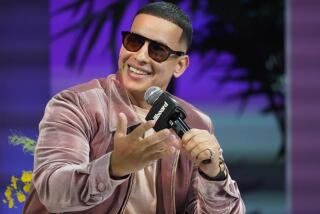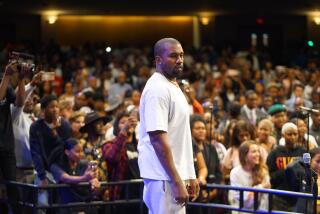New York Greets Tyson as a Hero : Boxing: Religious leaders compare him to the Prodigal Son, but there are also protests.
- Share via
NEW YORK — Not once, not twice, but three times during Tuesday’s welcome rally in Harlem for Mike Tyson, the former heavyweight champion’s long journey from an Indiana prison cell back home to New York City was compared to the Biblical story of the Prodigal Son.
Before a crowd of several hundred in front of the Apollo theater, the scriptural tale of redemption and forgiveness was retold for the benefit of Tyson, who was convicted in 1992 of raping Desiree Washington, a contestant in the Miss Black America contest: The prodigal son fell in among the unrighteous. But when he returned to his family, he was greeted with open arms.
“Get the ring and put it on his finger,” shouted Bishop Norman Quick, among the black leaders who spoke on behalf of Tyson. “Get the clothes and put them on his back, get the shoes and put them on his feet. And let all the family shout hallelujah. Hallelujah. Hallelujah. . . . Can these bones live?”
“I bring you our brother,” said the Rev. Al Sharpton, picking up the same theme as he introduced Tyson after more than an hour of speeches. “He has come home.”
“The powers that be didn’t want you here and didn’t want me to speak to you,” said Tyson, who will return to ring Aug. 19 against unheralded fighter Peter McNeeley. “But we’ll beat them because God’s on our side.”
Monday night, on the same spot in front of the theater, a group of prominent African Americans gathered to protest what they considered to be Tuesday’s glorification of sexual assault, topping off a week in which plans to celebrate Tyson’s return to New York had become one of the most controversial and divisive issues among the city’s black community.
The group invited Tyson to join them Monday and publicly repent. He declined, preferring to spend the evening shopping at a chic boutique on Manhattan’s Upper West Side. Tuesday there was only scorn and defiance for those critical of the Tyson welcome. Instead, letters of support were read aloud from poet Maya Angelou and Harlem power broker Percy Sutton, and in withering afternoon heat, a long list of civic and religious leaders from Harlem rose to welcome Tyson home.
“Don’t you dare tell us we can’t welcome a brother back to the family,” said New York radio personality Gary Byrd, who served as emcee. “If Malcolm X can do it, then Mike Tyson can do it.”
“Do you all hear about the woman in South Carolina who drove her children into the river and drowned them? Mike Tyson didn’t do that,” said activist attorney C. Vernon Mason, in a moment typical of the sarcasm with which Tyson’s critics were greeted. “Do you hear about the bomb that was dropped on the building in Oklahoma City? Mike Tyson didn’t do that. Did you all remember Jeffrey Dahmer, who ate all the people and put them in a refrigerator? Mike Tyson didn’t do that either.”
Tyson, immaculate in a white suit and flanked by his two legendary hirsute advisers, Don King and Sharpton, said only a few words before publicly pledging several hundred thousand dollars to a handful of New York City charities.
“I’m a little nervous to be speaking in front of so many people,” he said, to loud cheers, after greeting the crowd with the traditional Arabic greeting of Islam, the religion he is said to have adopted in prison.
At one point, Tyson was asked if he was sorry for the rape. King, his promoter, shouted, “Sorry for what? Come on!”
When Tyson was queried about his history of violence toward black women, his manager, John Horne, yelled: “Mike Tyson is not going to sit up here and answer silly questions. I am not going to let him sit here and be disrespected.”
A woman stood up and shouted: “I just want you to know that African-American women love you.”
“Thanks very much,” Tyson replied.
More to Read
Go beyond the scoreboard
Get the latest on L.A.'s teams in the daily Sports Report newsletter.
You may occasionally receive promotional content from the Los Angeles Times.










